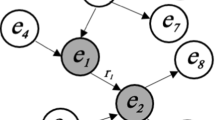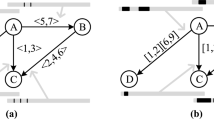Abstract
In recent years, cognition map techniques for human insights have already played a significant part in complex or ill-structured problem solving. There are increasing interests on computational methods rather than hand-drawing methods to build an cognition graph for insights generation. In this paper, a systematic approach called Temporal-IdeaGraph is proposed to build a directed cognition graph based on event sequences. Firstly, an algorithm of frequent sequence mining is employed to capture sequential patterns and a method is then designed to remove duplicate patterns. Secondly, relevant patterns are merged and visualized into a directed cognition graph. An algorithm is further proposed to identify bridge events and bridge patterns which would trigger human’s deeper insights for better decision making. Finally, two real case studies validate the effectiveness of proposed approach.









Similar content being viewed by others
References
Patnaik, D., Butler, P., Ramakrishnan, N., Parida, L., Keller, B.J., Hanauer, D.A.: Experiences with mining temporal event sequences from electronic medical records: initial successes and some challenges. In: Proceedings of the 17th ACM SIGKDD International Conference on Knowledge Discovery and Data Mining, pp. 360–368. ACM (2011)
Mannila, H., Toivonen, H., Verkamo, A.I.: Discovery of frequent episodes in event sequences. Data Min. Knowl. Discov. 1(3), 259–289 (1997)
Zhou, W., Liu, H., Cheng, H.: Mining closed episodes from event sequences efficiently. In: Pacific-Asia Conference on Knowledge Discovery and Data Mining, pp. 310–318. Springer, Berlin (2010)
Yan, X., Han, J.: Clospan: mining closed sequential patterns in large datasets. In: Proceedings of the Third SIAM International Conference on Data Mining, vol. 112, p. 166. SIAM (2003)
Cheng, H., Yan, X., Han, J.: Incspan: incremental mining of sequential patterns in large database. In: Proceedings of the Tenth ACM SIGKDD International Conference on Knowledge Discovery and Data Mining, pp. 527–532. ACM (2004)
Memon, T., Lu, J., Hussain, F.K.: Human-centric cognitive decision support system for ill-structured problems. In: Human-Centric Decision-Making Models for Social Sciences, pp. 289–313. Springer, Berlin (2014)
Wikiversity. Introduction to ill structured problems. http://en.wikiversity.org/wiki/Introduction_to_IllStructured_Problems (2016)
Silver, S.D.: Designing technology for managing the information exchange of decision making teams. Decis. Support Syst. 61, 136–146 (2014)
Wang, H., Ohsawa, Y.: Idea discovery: a scenario-based systematic approach for decision making in market innovation. Expert Syst. Appl. 40(2), 429–438 (2013)
Wijekumar, K.K., Jonassen, D.H.: The role of computer tools in experts solving ill-structured problems. Comput. Hum. Behav. 23(1), 664–704 (2007)
Jie, L., Niu, L., Zhang, G.: A situation retrieval model for cognitive decision support in digital business ecosystems. IEEE Trans. Ind. Electron. 60(3), 1059–1069 (2013)
Sánchez-Pi, N., Carbó, J., Molina, J.M.: A knowledge-based system approach for a context-aware system. Knowl. Based Syst. 27, 1–17 (2012)
Jifa, G., Tang, X.: Meta-synthesis approach to complex system modeling. Eur. J. Oper. Res. 166(3), 597–614 (2005)
Liu, D.-R., Ke, C.-K.: Knowledge support for problem-solving in a production process: a hybrid of knowledge discovery and case-based reasoning. Expert Syst. Appl. 33(1), 147–161 (2007)
Goode, N., Beckmann, J.F.: You need to know: there is a causal relationship between structural knowledge and control performance in complex problem solving tasks. Intelligence 38(3), 345–352 (2010)
Dumas, A.: Building totems: metaphor making in product development. Des. Manag. J. (Former Ser.) 5(1), 71–82 (1994)
Buzan, T., Buzan, B., Harrison, J.: The mind map book: unlock your creativity, boost your memory, change your life. Pearson BBC Active (2010)
Hohmann, L.: Innovation Games: Creating Breakthrough Products Through Collaborative Play. Pearson Education, Upper Saddle River (2006)
Fayyad, U., Piatetsky-Shapiro, G., Smyth, P.: From data mining to knowledge discovery in databases. AI Mag. 17(3), 37 (1996)
Louis, A.L., Engelbrecht, A.P.: Unsupervised discovery of relations for analysis of textual data. Digit. Investig. 7(3), 154–171 (2011)
Wang, H., Ohsawa, Y., Hu, X., Xu, F.: Idea discovery: a context-awareness dynamic system approach for computational creativity. In: Smart Modeling and Simulation for Complex Systems, pp. 99–111. Springer, Berlin (2015)
Wang, H., Zhang, C., Wang, W., Hu, X., Xu, F.: Human-centric computational knowledge environment for complex or ill-structured problem solving. In: 2014 IEEE International Conference on Systems, Man, and Cybernetics (SMC), pp. 2940–2945. IEEE (2014)
Zhang, C., Wang, H., Cao, L., Wang, W., Fanjiang, X.: A hybrid term-term relations analysis approach for topic detection. Knowl. Based Syst. 93, 109–120 (2016)
Wang, H., Ohsawa, Y., Lv, P., Hu, X., Xu, F.: Ideagraph: turning data into human insights for collective intelligence. In: Foundations and Applications of Intelligent Systems, pp. 33–44. Springer, Berlin (2014)
Agrawal, R., Srikant, R.: Mining sequential patterns. In: Data Engineering, 1995. Proceedings of the Eleventh International Conference on, pp. 3–14. IEEE (1995)
Srikant, R., Agrawal, R.: Mining sequential patterns: generalizations and performance improvements. In: International Conference on Extending Database Technology, pp. 1–17. Springer, Berlin (1996)
Han, J., Pei, J., Mortazavi-Asl, B., Chen, Q., Dayal, U., Hsu, M.-C.: Freespan: frequent pattern-projected sequential pattern mining. In: Proceedings of the Sixth ACM SIGKDD International Conference on Knowledge Discovery and Data Mining, pp. 355–359. ACM (2000)
Han, J., Pei, J., Mortazavi-Asl, B., Pinto, H., Chen, Q., Dayal, U., Hsu, M.C.: Prefixspan: mining sequential patterns efficiently by prefix-projected pattern growth. In: Proceedings of the 17th International Conference on Data Engineering, pp. 215–224 (2001)
Agrawal, R., Srikant, R., et al.: Fast algorithms for mining association rules. In: Proceedings of the 20th International Conference on Very Large Data Vases, VLDB, vol. 1215, pp. 487–499 (1994)
Aggarwal, C.C., Han, J.: Frequent Pattern Mining. Springer, Berlin (2014)
Ohsawa, Y.: Chance discoveries for making decisions in complex real world. New Gener. Comput. 20(2), 143–163 (2002)
Bezerra, F., Wainer, J., van der Aalst, W.M.P.: Anomaly detection using process mining. In: Enterprise, Business-Process and Information Systems Modeling, pp. 149–161. Springer, Berlin (2009)
Fruchterman, T.M.J., Reingold, E.M.: Graph drawing by force-directed placement. Software 21(11), 1129–1164 (1991)
Ohsawa, Y., Benson, N.E., Yachida, M.: Keygraph: automatic indexing by co-occurrence graph based on building construction metaphor. In: Research and Technology Advances in Digital Libraries, 1998. ADL 98. Proceedings. IEEE International Forum on, pp. 12–18. IEEE (1998)
Matsumura, N., Matsuo, Y., Ohsawa, Y., Ishizuka, M.: Discovering emerging topics from www. J. Contingencies Crisis Manag. 10, 73–81 (2002)
Chiu, T.-F., Hong, C.-F., Chiu, Y.-T.: Visualization of financial trends using chance discovery methods. In: International Conference on Industrial, Engineering and Other Applications of Applied Intelligent Systems, pp. 708–717. Springer, Berlin (2008)
Wang, H., Xu, F., Hu, X., Ohsawa, Y.: Ideagraph: a graph-based algorithm of mining latent information for human cognition. In: 2013 IEEE International Conference on Systems, Man, and Cybernetics, pp. 952–957. IEEE (2013)
Zhang, C., Wang, H., Wang, W., Xu, F.: An improved ideagraph algorithm for discovering important rare events. In: 2014 IEEE International Conference on Systems, Man, and Cybernetics (SMC), pp. 3290–3295. IEEE (2014)
wintersong. The click-stream dataset of a hungarian on-line news portal. http://www.datatang.com/datares/go.aspx?dataid=602465 (2011)
Yiaipai. The comment data of the best-selling 284 laptop in Jingdong. http://www.datatang.com/data/46283 (2014)
Wang, H., Ohsawa, Y.: ichance: a web-based innovation support system for business intelligence. Int. J. Organ. Collect. Intell. 2(4), 48–61 (2011)
Wang, H., Ohsawa, Y., Nishihara, Y.: Innovation support system for creative product design based on chance discovery. Expert Syst. Appl. 39(5), 4890–4897 (2012)
Cui, B., Mei, H., Ooi, B.C.: Big data: the driver for innovation in databases. Natl. Sci. Rev. 1(1), 27–30 (2014)
Zhao, M., Wang, H., Cao, L., Zhang, C., Yin, H., Xu, F.: Lsif: a system for large-scale information flow detection based on topic-related semantic similarity measurement. In: 2015 IEEE/WIC/ACM International Conference on Web Intelligence and Intelligent Agent Technology (WI-IAT), vol. 1, pp. 417–424. IEEE (2015)
Lu, S., Zhao, M., Zhang, H., Zhang, C., Wang, W., Wang, H.: Genderpredictor: a method to predict gender of customers from e-commerce website. In: 2015 IEEE/WIC/ACM International Conference on Web Intelligence and Intelligent Agent Technology (WI-IAT), vol. 3, pp. 13–16. IEEE (2015)
Wang, Y., Zhang, C., Wang, W., Xu, F., Wang, H.: Cifdal: a graph layout algorithm to enhance human cognition in idea discovery. In: Systems, Man, and Cybernetics (SMC), 2015 IEEE International Conference on, pp. 1545–1550. IEEE (2015)
Wang, F., Lu, S., Zhang, C., Wang, Q., Xu, F.: Timing-ideagraph: a directed cognition graph approach for decision making based on temporal event sequences. In: Computer Supported Cooperative Work in Design (CSCWD), 2016 IEEE 20th International Conference on, pp. 322–326. IEEE (2016)
Su, B., Zhou, J., Ding, X., Wang, H., Wu, Y.: Hierarchical dynamic parsing and encoding for action recognition. In: European Conference on Computer Vision, pp. 202–217. Springer, Berlin (2016)
Su, B., Ding, X., Liu, C., Wu, Y.: Heteroscedastic max-min distance analysis. In: Proceedings of the IEEE Conference on Computer Vision and Pattern Recognition, pp. 4539–4547 (2015)
Su, B., Ding, X.: Linear sequence discriminant analysis: a model-based dimensionality reduction method for vector sequences. In: Proceedings of the IEEE International Conference on Computer Vision, pp. 889–896 (2013)
Zhang, C., Wang, H., Wang, W., Xu, F.: Rcfged: retrospective coarse and fine-grained event detection from online news. In: Systems, Man, and Cybernetics (SMC), 2015 IEEE International Conference on, pp. 139–144. IEEE (2015)
Xie, M., Yin, H., Wang, H., Xu, F., Chen, W., Wang, S.: Learning graph-based poi embedding for location-based recommendation. In: Proceedings of the 25th ACM International on Conference on Information and Knowledge Management, pp. 15–24. ACM (2016)
Yin, H., Zhou, X., Shao, Y., Wang, H., Sadiq, S.: Joint modeling of user check-in behaviors for point-of-interest recommendation. In: Proceedings of the 24th ACM International on Conference on Information and Knowledge Management, pp. 1631–1640. ACM (2015)
Yin, H., Zhou, X., Cui, B., Wang, H., Zheng, K., Nguyen, Q.V.H.: Adapting to user interest drift for poi recommendation. IEEE Trans. Knowl. Data Eng. 28(10), 2566–2581 (2016)
Acknowledgements
This work is supported by Natural Science Foundation of China (Grant Nos. 61672501, 61303164, 61402447 and 61502466). This work is also sponsored by Development Plan of Outstanding Young Talent from Institute of Software, Chinese Academy of Sciences (ISCAS2014-JQ02).
Author information
Authors and Affiliations
Corresponding authors
Additional information
Wei Wang and Chen Zhang are the co-first authors. Hao Wang and Chen Zhang contribute main idea to this paper as the corresponding authors. Yang Gao and Yuanman Zheng are also the corresponding authors.
Rights and permissions
About this article
Cite this article
Wang, W., Zhang, C., Wang, H. et al. A cognition graph approach for insights generation from event sequences. Cluster Comput 20, 1679–1690 (2017). https://doi.org/10.1007/s10586-017-0744-4
Received:
Revised:
Accepted:
Published:
Issue Date:
DOI: https://doi.org/10.1007/s10586-017-0744-4




